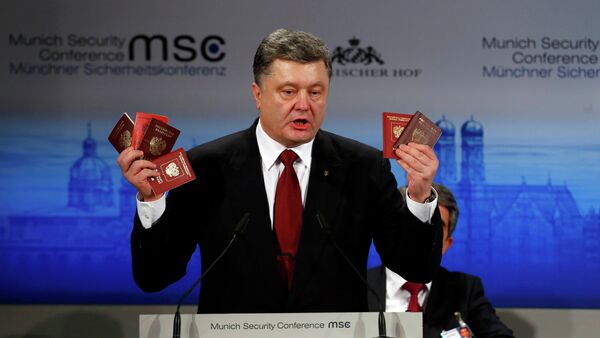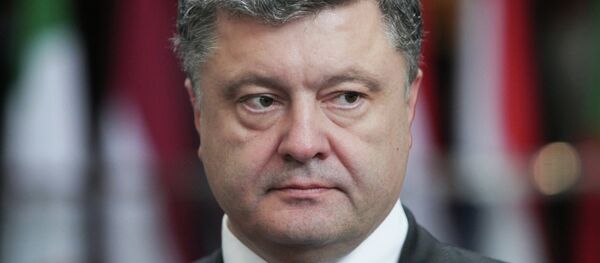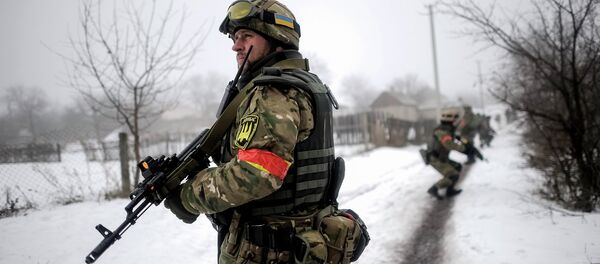Social media users from Russia and elsewhere were quick to question and disparage Ukrainian President Petro Poroshenko's showing off of Russian passports, which he says are "the best evidence" of a Russian military presence in Ukraine.
Speaking at the Munich Security Conference on Saturday, the Ukrainian President held up several passports which he said belonged to Russian military personnel serving in Ukraine. "I [have taken] with me the passports and military ID of Russian soldiers and officers," Poroshenko told conference attendees. "This is the best evidence for the aggression and for the presence of Russian troops."
Those are passports and military IDs of Russian soldiers who 'lost their way' into Ukraine. pic.twitter.com/iAr2gQwE9O
— Петро Порошенко (@poroshenko) 7 февраля 2015
But Twitter users weren't so quick to accept Poroshenko's evidence:
Poroshenko wants us to believe, that Russian special-ops carry passports with them while on covert mission... okay.
— Olivier Fehr (@ofehr_en) 8 февраля 2015
.@27khv: "Russian soldiers cannot use their passports while on active service – they must hand them in." http://t.co/l5UM6ZyRBc
— Christoph Germann (@newgreatgame) 8 февраля 2015
Others questioned the condition of the documents themselves.
@ofehr_en And also passports found in a warzone are in mint condition and look brand new
— Alex_T (@Altook) 8 февраля 2015
The documents held up by the president featured three 'internal' passports (an internal travel document used in Russia, similar to a national ID card); a 'military ticket' of the kind given out to all Russian men, whether or not they have served in the military; as well as two passports for international travel, which Russians did not even need to enter Ukraine until recently.
Serious questions aside, the creative power of the social media soon came to life, with users posting photoshopped images of the Ukrainian president holding various objects ranging from sock puppets and maracas to Pokemon cards and Cheburashka dolls in military fatigues.
#Poroshenko tourné en dérision en Ukraine et ailleurs La prochaine fois ramènera t il un tank ? #MSC2015 pic.twitter.com/Jm0LNYayqB"
— clara sheler (@twittine69) 7 февраля 2015
"Если с паспортами не прокатит, то в следующий раз принесу балалайки" - подумал Порошенко. pic.twitter.com/Brie3tkhLP
— 50Megatonn (@50megatonn) 7 февраля 2015
"If they don't buy the passports, next time I'll bring balalaykas," thought Poroshenko.
— НОВОРОССИЯ (@NOVORUSSIA2015) 7 февраля 2015
Others posted images of what the inside of one of the passports might look like, with one user posting an image of Jason Bourne's passport in the Bourne Identity:
Here's the data page of one of those Russian passports Willy Wonka/Poroshenko was waving in Munich. pic.twitter.com/AvOoS5hFqV
— Bryan MacDonald (@27khv) 7 февраля 2015
Another went a step further to really press the point home, featuring the Bourne Identity passport, but with an image of Rocky opponent Ivan Drago with a Russian flag waving behind him.
Oh! Poroshenko's Iron proof - Russian passport! @dagensnyheter #svpol #Sweden @SR_utrikes @SvD pic.twitter.com/jor4d2qN1C
— DeviatePress (@Deviatepress) 8 февраля 2015
"We asked the Ukrainian side to give us copies of the documents containing last names, because the IDs such as those shown yesterday could easily be bought," Foreign Ministry official Viktor Sorokin told Russia's RIA Novosti on Sunday. He noted that "document covers like the ones shown yesterday can easily be bought at a street market."
Last month, President Poroshenko had alleged that there were up to 9,000 Russian military personnel fighting on the side of the separatist eastern regions. The US State Department has not been able to provide evidence for the allegations, while OSCE observers based at border crossings noted that "there is absolutely no way you can possibly hide huge military formations on a relatively small territory wide open to reporters and OSCE representatives."
Since the start of Kiev's military assault on eastern Ukraine’s independence supporters in April 2014, Kiev and the West have repeatedly accused Moscow of military intervention in the crisis. The accusers claim that the Russian government has sent troops and weaponry to help local militias, claims which Russian officials have repeatedly denied for lack of evidence.



